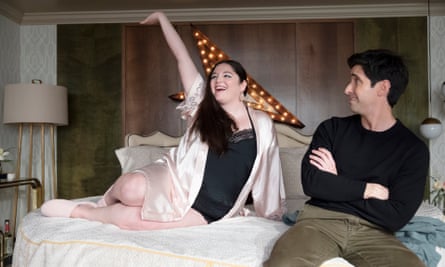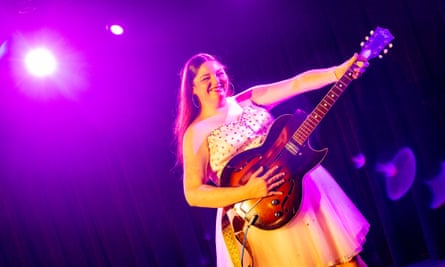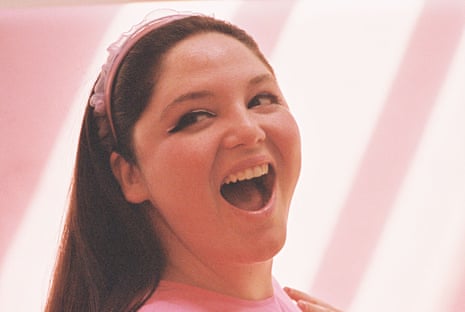Megan Stalter put a video online recently of a churchgoer from the US midwest distressed to be served by a Starbucks barista wearing Halloween cat ears. (“We’re not allowed to celebrate Jesus’s birthday, but we’re allowed to celebrate Satan’s parade?”) Played with a beautifully straight bat, it was of a piece with the scores of bitesized character sketches Stalter has uploaded throughout the Covid period. But not everyone got the memo. “I get hundreds of mean comments every day thinking it’s real,” Stalter says, on a video call from New York. “But I’m like: it’s a joke! It would take you only two minutes to look at my profile and know that I’m a comedian.”
Not just any comedian, but one of the hottest in the US right now – and in Britain, where her maiden run, at London’s Soho theatre this month, has already sold out. Stalter, 31, is that rare thing, a comic who prospered under lockdown. Her online videos and live broadcasts went stratospheric. A YouTube special, Little Miss Ohio, brought her cringe-comedy portraits to a wider audience. Then she was cast in HBO’s Hacks, which later bagged multiple comedy awards at the 2021 Emmys. “I couldn’t have gotten luckier,” Stalter admits, giggly over Zoom in her signature bright blue eyeshadow.
For all her success on television and online, it’s the stage where Stalter feels most in her element. “I’m never happier than when I’m on stage,” she says – before adding, hastily if not wholly convincingly: “I mean, besides being with the ones I love.
“I would never go on stage sick now,” she says. “But before the pandemic, when people still did [that], I would never feel sick while I was on stage. I would never think of anything that would make me sad. On stage, you are fully Zen. It sounds cheesy, but that’s how I know this is what I’m meant to do.”

In London, Stalter will be performing her standup show – not that it is standup in any conventional sense. “I play a character who is very confident and thinks she’s very talented, but her show is falling apart. It’s like a magic show with no tricks.” She was making waves in live comedy on the eve of the pandemic. “I’d just got a manager, I’d moved to New York, my shows started selling out. I thought: ‘Oh my God, my career is blowing up!’ But really it wasn’t.” That was still to come, when a global plague imprisoned Stalter in her apartment, cutting her off from her income and the thing she most loved doing.
“People ask all the time,” she tells me, “what does it feel like to blow up online during Covid? And it’s really strange, because I was only doing it to feel alive and normal. I wasn’t like: ‘Oh my God, I need attention,’ or trying to make my videos go viral. I just had to be silly online because there was nowhere else to do it.”
With characters such as the small business owner struggling to appear woke (“Hi, gay! Happy Pride month!”) or the “out-of-work actress talking about a possible sequel to a movie that came out nine years ago”, she cornered the market in brittle, delusional but oddly sympathetic nobodies, publicising themselves with a swagger while knowing, deep down, they have little to sell.
These are sketches for the era of the curated online self, and Stalter has mined to the tragicomic heart of social media just as Ricky Gervais once did with reality TV (both cite the films of Christopher Guest as an influence). “I love the comics who seem like they’re improving,” Stalter says, “whose characters feel like real people.”
Hers do, and throughout lockdown she used them to build a huge community of fans online – to whom she feels a debt of obligation today. “When I meet people at live shows now, it feels like I know them,” Stalter says. “The gigs feel so different to how they did before, because we were all online for a year and a half together, stuck in our homes! I know you have to have boundaries, but I never want to feel out of reach to the people that support me. Because that’s where you come from, right?”
Stalter is refreshingly down to earth, perhaps in part because of being born and raised in Ohio, whose population of “weird church ladies and soccer moms” (her words) she draws on in her work. The daughter of a nurse and a tattoo artist, she “really, really wanted to perform” from an early age. “I remember when I was little in choir and I got given a solo, and I was like: I was meant to sing. I wasn’t great, but I always thought I was really special” – she laughs at the memory – “and that people needed to see me on stage.”

It took a while for the world to agree. Opportunities to live the showbiz dream were scarce at home; Stalter soon moved to Chicago, at her mum’s urging. But if you can take the girl out of Ohio, you can’t take Ohio out of the girl. The comic voice Stalter began to develop came with a midwestern accent. Her characters, she has said, have “a level of sweetness while trying to do good [but don’t have] much money or fancy places to go to”. Today, she describes her midwest alter egos as “always apologetic, and very polite”. It’s also about their worldview. “Ohio is pretty Republican,” Stalter says. “And it’s interesting, growing up knowing and being related to those people whose beliefs are so different to my own.”
She may attract the online ire of confused progressives, who mistake her churchy midwesterners for the real thing. But Ohioans themselves, the butt of her jokes, have never complained, Stalter says, because the videos are made with affection and with the understanding that “everyone really is trying to be good. I know a lot of people that do bad stuff and believe in very backwards things, who also literally think they are morally right. But I grew up loving these people. These were my best friends. And it’s impossible to play them in a mean way if I know that they’re not trying to be mean or bad.”
Ohio is even more proud of Stalter now that she’s a TV star, as the dotty assistant Kayla to bigshot comedy agent Jimmy in the hit series Hacks. Series co-creator Paul W Downs knew Stalter from her live comedy, and before she auditioned for the show, “my friend sent me a screenshot of the script and it said: ‘Kayla – think Megan Stalter.’ So I was really afraid not to get the part. To be like: ‘Oh, this other actor does Megan better than Megan does’? I would, like, absolutely die!”
She needn’t have worried: the part was hers, and she became the series’ breakout star. “I’m living the dream,” she says now. “I want to keep acting and doing live comedy for ever.” You wouldn’t bet against it. “I keep thinking: ‘This is it!’” says Stalter of her success. “And then more happens, and you’re like: ‘Oh no, this is it!’ And I think that’s because I’ve always loved every part. At every stage, I’ve always felt: this is the dream. This is all I’ve ever wanted to do.”
Megan Stalter performs at Soho theatre, London, 30 November to 11 December.
